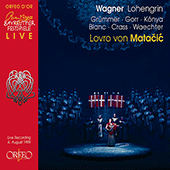Sandor Konya
Sándor Kónya studied singing initially with Ferenc Székelyhidy at the Franz Liszt Academy in Budapest. His progress was interrupted by World War II, during which he was for a time a prisoner of war in Germany; but following the advent of peace he continued his studies in Detmold with Fred Husler, then in Rome with Mancini and in Milan with Rico Lani.
Kónya’s operatic stage debut came in 1951 as Turiddù / Cavalleria rusticana with Bielefeld Opera, where he remained until 1954, undertaking both heroic as well as lighter roles. He sang widely in Germany as a guest, for instance at Hamburg and Stuttgart, and was with the Darmstadt Opera for the 1954–1955 season before becoming a member of the Deutsche Oper’s ensemble in Berlin in 1955, remaining with this company until 1964. Here he created the part of Leandro in the 1956 world premiere of Henze’s König Hirsch. As well as appearing at Berlin he was contracted as a guest with the opera companies of Hamburg from 1956 to 1960 and Munich from1958 to 1961.
When he sang the part of Nureddin in Cornelius’s Der Barbier von Bagdad at the 1956 Edinburgh Festival Kónya attracted attention and in 1958 he made his debut at the Bayreuth Festival, singing Froh / Das Rheingold and the title role of Lohengrin, which was to become his international calling card. He returned to Bayreuth for the 1959, 1960, 1967 and 1971 Festivals. During 1959 he made his debut at the Paris Opera as Lohengrin and at the Caracalla Baths, Rome, before appearing for the first time during 1960 at La Scala, Milan in the title role of Parsifal and in the USA with the San Francisco Opera as Dick Johnson / La fanciulla del West, Lohengrin, Rodolfo / La Bohème and Radamès / Aida.
With the Metropolitan Opera, New York, Kónya’s debut was as Lohengrin in the autumn of 1961. He became a mainstay of the company until the end of 1974, singing a wide range of parts in both the Italian and German repertoires: for example Radamès, Rodolfo, Pinkerton / Madama Butterfly, Cavaradossi / Tosca, Calaf / Turandot, Edgardo / Lucia di Lammermoor, Max / Der Freischütz, Erik / Der fliegende Holländer and Walther von Stolzing / Die Meistersinger von Nürnberg, as well as Don José / Carmen and Števa / Jenůfa. Kónya first appeared at the Royal Opera House, London in 1963 as Lohengrin under Klemperer and returned to sing Calaf in 1973. At the Vienna State Opera in 1964 and 1965 he sang Cavaradossi and Calaf as well as other parts and made his debut at the Teatro Colón, Buenos Aires, in 1968. A late role was the title role in Otello in Strasbourg in 1973.
In tandem with his operatic activities, Kónya also sang with great success in operetta and in concert, touring throughout Germany, Spain, Portugal and North America. Following his retirement from the operatic and concert stages he taught at Stuttgart Conservatory. Having moved to Ibiza during the 1980s he founded Pro Arte, an organisation to promote operatic productions on the island.
Kónya’s mellifluous and easily produced top register made him an ideal Lohengrin, a role he sang on more than 250 occasions, and gave him in addition the plangency well suited to the Italian repertoire. On stage he was discreet and dignified. His recorded legacy is relatively modest but worthwhile.
© Naxos Rights International Ltd. — David Patmore (A–Z of Singers, Naxos 8.558097-100).

















